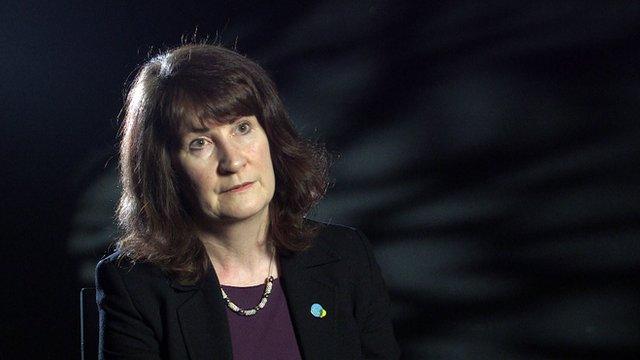Biggest employers 'not paying living wage'
- Published
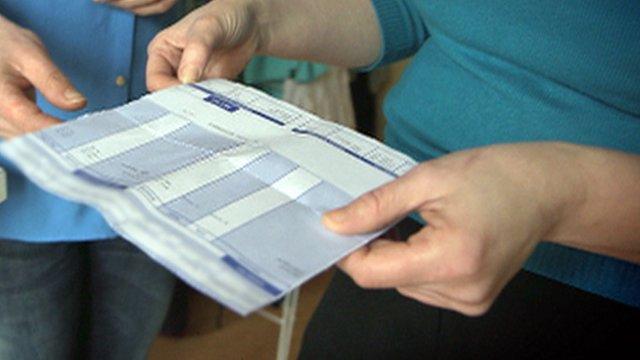
Shop worker Tracy Hamilton looks at her payslip showing her £6.50 per hour minimum wage
Only 10 of the 50 biggest employers in Scotland said they pay all staff working for them the living wage, according to a BBC investigation.
The living wage is a voluntary hourly rate that is calculated according to the basic cost of living in the UK.
At £7.85 an hour, it is 21% higher than the legally-set minimum wage of £6.50.
The BBC research also showed that most Scottish Premiership football clubs were paying some of their off-pitch staff less than the living wage.
The living wage has been adopted by more than 1,000 employers across the UK.
Firms who have signed up to the voluntary scheme include Barclays, Standard Life and the National Portrait Gallery, as well as many local councils and charities.
Tracey earns the minimum wage, £6.50 an hour, and says she often runs out of electricity: "I don't put the lights on"
The BBC Scotland Investigates: Low Pay For Life programme asked 50 of Scotland's biggest employers, external and the majority said they either did not pay all staff the living wage, or would not say.
Some said they had other benefits for staff such as discount cards and share schemes and made clear that they paid at least the national minimum wage.
Only 10 companies responded in a way that suggested their pay policy was in line with the Living Wage Foundation's definition of a Living Wage employer.
That requires them to be in the process of changing all contracts with companies, such as cleaning and security firms, to ensure that any staff working regularly on their premises are paid the living wage as well as their directly-employed workers.
About 200 organisations in Scotland are accredited by the Living Wage foundation.
One of the biggest is the accountancy firm, KPMG.
KPMG's Jenny Stewart says employee and employer benefit from paying the living wage
The Head of Infrastructure and Government at KPMG, Jenny Stewart, said it was the right thing to do as a company.
She said now the Living Wage was established it was not costing a penny more.
'Low pay trap'
Speaking on BBC Radio Scotland's Good Morning Scotland programme, Roseanna Cunningham, Cabinet Secretary for Fair Work, Skills and Training, said more had to be done to ensure people were not stuck on low pay for life.
She said: "There is a kind of 'no pay, low pay' trap that people get caught up in, a sort of cycle.
"At Scottish government level, we don't have the kind of specific powers that we need to have over things like the minimum wage in order to effect concrete change through government measures.
"However, what we are doing, I think quite effectively, is using the soft power of government to encourage and cajole employers who are still not quite there yet in their thinking, to be realising the enormous benefit of paying their staff a living wage.
"We know from studies that it does result in increased productivity, much reduced staff turnover - obviously, and a general much better feeling in the workplace."
The CBI, which represents employers, has warned of job losses if companies were required to pay the Living Wage.
It added: "Rather than requiring firms to introduce pay rises that many cannot afford, we must look at ways to raise living standards sustainably."
Football fans have been putting pressure on clubs to pay all staff the Living Wage.
Celtic, in particular, has been pressed on why it has not introduced it.
A group of fans lodged a resolution at the club's AGM last year, on behalf of shareholders, asking the club to implement the Living Wage.
But clubs have objected to football being singled out in the Living Wage debate and said they did community and charity work.
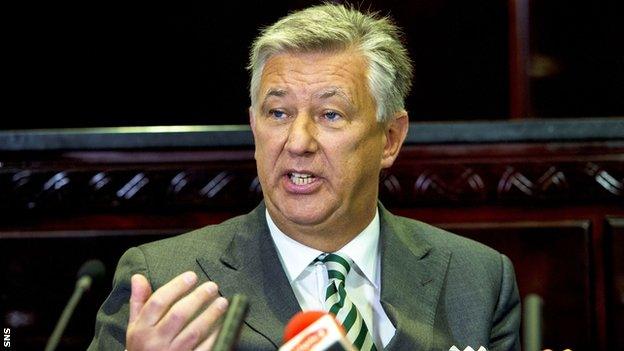
Peter Lawwell says Celtic have been unfairly targeted over the living wage
BBC Scotland approached all the clubs in the Premiership asking them to complete a survey on wages.
The clubs responded through the SPFL making it clear they would not take part.
As a result, the production team contacted clubs in the Premiership enquiring about hospitality work.
Our team established that seven of the clubs - including Celtic - were employing staff at below the living wage.
Some of the contracts were with the club directly, others were for work at the stadium through a third party contractor.
The programme was unable to establish what the pay rates at the remaining clubs were. All of them paid the statutory minimum wage or above.
The chief executive of Celtic, Peter Lawwell, has a pay package worth nearly £1m a year.
From information gathered during the BBC's investigation, someone working in hospitality at the club would need to work for about 70 years to earn what he earns in a year.
Peter Kelly from the Poverty Alliance, which promotes the living wage, told the programme that the clubs needed to do more.
He said: "It's really unacceptable, I mean we would say the same about the majority of businesses in any other sector not paying the living wage - we really think that they can.
"These are clubs that are leaders very often in their communities. They need to be showing leadership in terms of pay as well, there's a lot more they could be doing."
The clubs involved declined the opportunity to comment on the BBC's findings.
Results of BBC football research in full:
ABERDEEN Rate starts at £6.50 although there is some progression. Below Living Wage
CELTIC The BBC was told Celtic employ their own staff for hospitality and pay them £6.70 an hour. Team member visited a Celtic FC club store on Argyle Street and discovered from an assistant manager and two store associates that they are paid just above minimum wage at £6.70 an hour. Below Living Wage
DUNDEE UNITED The BBC was told wages are "not far off minimum wage." Below Living Wage
HAMILTON Representative said work was at minimum wage (he guessed that at £6.51). Below Living Wage
MOTHERWELL Bar work sometimes available. The wage is between £6.58 and £7.00 - offered to take a CV. Below Living Wage
PARTICK THISTLE Partick Thistle confirmed bar work is minimum wage - happy to take a CV. Below Living Wage
ST JOHNSTONE Confirmed there are vacancies at minimum wage, paid hourly. Below Living Wage
BBC Scotland Investigates: Low Pay for Life is on BBC1 Scotland on 18 May at 20:30 and on the iplayer afterwards.
- Published2 November 2014
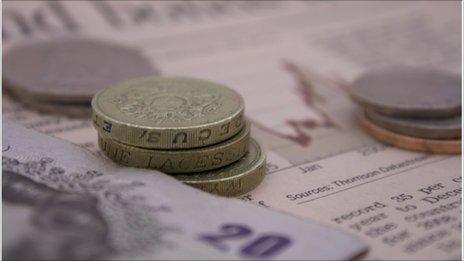
- Published3 November 2014

- Published18 May 2015
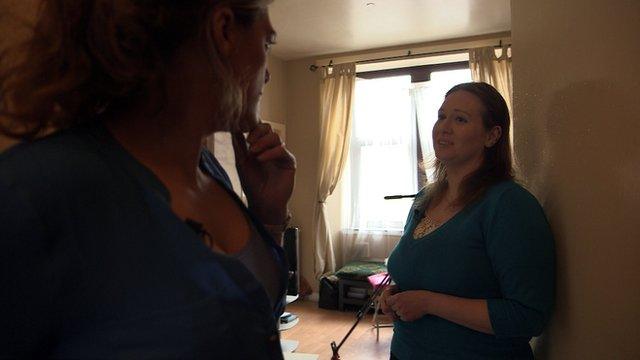
- Published18 May 2015
